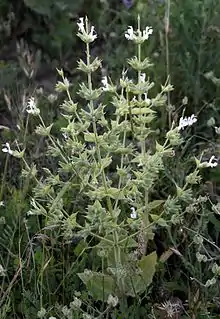Salvia macrosiphon
Salvia macrosiphon is a species of flowering plant in the mint family, Lamiaceae.[1][2] It is native to Iraq, Iran, Pakistan, Afghanistan, Transcaucasia, and Turkey, where it grows at the edges of fields. It is a perennial herb with a white corolla and ovate nutlets. It flowers in May and fruits from June onwards. Although the plant is similar to S. spinosa, it differs in that it has narrower leaves and calyces, is less indurate and has less spiny fruiting calyces, and possesses a longer corolla tube.[3]
| Salvia macrosiphon | |
|---|---|
 | |
| Scientific classification | |
| Kingdom: | Plantae |
| Clade: | Tracheophytes |
| Clade: | Angiosperms |
| Clade: | Eudicots |
| Clade: | Asterids |
| Order: | Lamiales |
| Family: | Lamiaceae |
| Genus: | Salvia |
| Species: | S. macrosiphon |
| Binomial name | |
| Salvia macrosiphon | |
| Synonyms[1] | |
|
Salvia albifrons Nábelek | |
References
- "Salvia macrosiphon Boiss". Plants of the World Online. The Trustees of the Royal Botanic Gardens, Kew. n.d. Retrieved September 6, 2020.
- "Salvia macrosiphon Boiss". World Flora Online. The World Flora Online Consortium. n.d. Retrieved September 6, 2020.
- Kahraman, A.; F. Celep & M. Dogan (2009). "A New Record for the Flora of Turkey: Salvia macrosiphon Boiss. (Labiatae)". Turkish Journal of Botany. 33: 53–55.
This article is issued from Wikipedia. The text is licensed under Creative Commons - Attribution - Sharealike. Additional terms may apply for the media files.